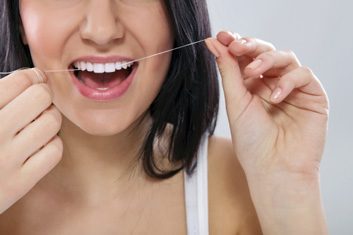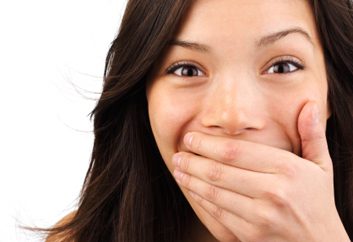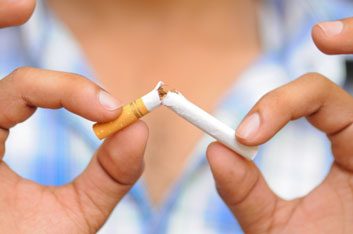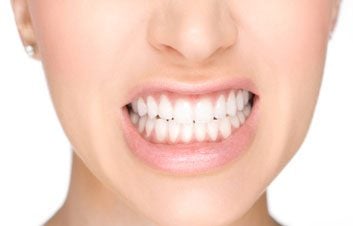
1. Not flossing
Flossing is one of the most important dental health habits, yet it’s the most likely to be forgotten or skipped, according to Dr. Gary MacDonald, vice president of the Canadian Dental Association. With just 28 percent of Canadians flossing at least five times a week, you are not alone if you’re guilty of skipping this simple tooth care step. While regular brushing does a good job of removing plaque, your toothbrush can only reach about two-thirds of the surface of your teeth, which means that gingivitis-causing plaque or tartar could be building up on the remaining one-third. By flossing at least once a day, you’ll be able to cure bad breath caused by food particles lodged between the teeth, and even lower your risk of gum disease. If you’re still not convinced that flossing is worth it, heed this advice that MacDonald tells his patients: “You don’t have to floss all of your teeth, just the ones you want to keep.”

2. Teeth grinding
“Grinding is when you actively slide your teeth back and forth over each other,” explains MacDonald. It often occurs during the night and can become a fairly serious problem for teeth and the temporomandibular joint (the joint that hinges the jaw onto the skull, also known as the TMJ). “There’s no complete agreement on the cause [of teeth grinding], but daily stress is cited as a major factor,” says MacDonald. Over time, this habit can lead to fractured or broken teeth. MacDonald says he’s seen patients split their teeth through the root as a result of grinding.
To lessen the effects of this potentially painful habit, a nighttime grinding appliance (similar to a sports mouth guard, but slightly smaller) can be worn to prevent teeth-on-teeth grinding and to slightly open the mouth, putting the TMJ in a more relaxed resting position. Physiotherapy or massage therapy can also offer teeth grinders relief through stretching and massage, which will help the jaw and facial muscles to relax.

3. Smoking
This hard-to-quit habit can increase your chances of developing a life-threatening illness, but the good news is that whether you’ve been a smoker for one year or for ten, quitting can quickly lower your risk of developing oral cancer, lung cancer, heart disease, emphysema and painful lesions in the mouth that do not heal.
If you’re looking for another reason to quit, the threat of a missing tooth might persuade you to pass on purchasing your next pack. In addition to a long list of negative cosmetic effects, including a reduced sense of smell and taste, bad breath, a receding gum line and yellow-tinted teeth, tobacco use is a major cause of tooth loss in adults.

4. Cheek biting
Accidental cheek or lip biting is a common and, although painful, mostly harmless. Cheek biting becomes problematic when misaligned teeth, ill-fitting false teeth or a nervous cheek chewing habit (not unlike nail biting) cause constant biting and chronic cheek irritation. “The chronic presence of [mouth] sores can lead to serious infection,” says MacDonald. Beyond uncomfortable sores and an increased potential for infection, there is also some concern that cheek chewing could be a cause of oral cancer. “There is speculation that cheek biters are more susceptible to developing oral cancer. I wouldn’t be too quick to make that correlation, but mouth sores are certainly something that one would want to eliminate,” says MacDonald.

5. Thumb sucking
This baby habit is a lot more common in adults than most people realize, says MacDonald. When facial muscles and bone structure are developing during childhood and adolescence, thumb sucking can be the cause of crooked teeth, an open bite (a space between the top and bottom teeth), an overbite (what we often call buck teeth) or other facial deformities that would require orthodontic treatment to correct. But if you’ve recently taken up thumb sucking as a soothing habit during your adult years, “it’s basically a harmless habit,” says MacDonald. “If you’re over 18 and sucking your thumb…then you’re probably not going to change your facial structure.”
Related:
• 4 foods that are bad for your teeth
• 4 things you should know about tongue health
• 6 ways smoking affects oral health
